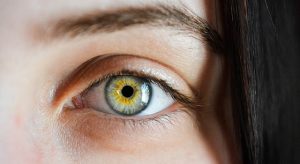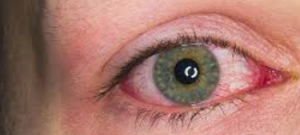If you experience sudden changes in vision it may be the result of a visual migraine.
Visual migraines are an episode of vision loss in one eye, usually lasting a short time and are rarely painful.
Classic migraines usually result in intense headaches or sensitivity to light and loud sounds. While, ocular migraines cause sudden vision impairment and are not necessarily painful. For example a street sign becoming difficult to read while driving.
Most ocular migraines don’t actually cause or indicate any damage to your brain or eyes.
What is a visual migraine?
Visual migraines can mimic other serious conditions, making it very important to see an eye doctor as soon as possible if you experience any sudden vision loss or changes to your vision.
A visual migraine, also known as an ocular migraine, causes temporary visual disturbance. This disturbance often appears suddenly and may create a blind spot moving across the visual field or the sensation of looking through a cracked window.
There are two types of ocular migraines:
- migraine auras
- retinal migraine
Migraine auras
Migraine auras are very common, affecting 1 in 5 migraine sufferers.
Migraine auras cause binocular visual distortions, affecting both eyes simultaneously. They may also cause:
- Numbness or tingling
- Mental fog
- Changes in taste, smell, or sense of touch.
An aura can occur with or without a migraine, and may sometimes precede a headache. The visual distortions are temporary and usually last around 30 minutes. They can impact performance in certain activities, such as driving and reading.
The most common visual symptoms of migraine auras include:
- Flashes of light
- Blind spots
- Zigzagging lines
- Glittering “stars”
Retinal migraines
Retinal migraines are rare, affecting 1 in 200 migraine sufferers.
Retinal migraines should be suspected if repeated temporary blindness or vision loss occur in one eye. This occurs due to sudden changes in tiny blood vessels in the back of the eye, known as the retina which transfers visual signals to the brain.
This sudden change in retinal blood flow produces the visual distortions and can occur before a headache starts or with a migraine, and can repeat throughout the day, and last from 5 to 20 minutes.
Retinal migraines can be an indication of a serious hidden health problem, retinal disease or other eye disease. These are considered a medical emergency.
The Find an Eye Doctor directory provides a list of eye doctors near you that may be able to help diagnose and treat your ocular migraine.
SEE RELATED: Migraine and Visual Auras
Causes of visual migraines
Some researchers believe ocular migraines are caused by changes or spasms in the retinal blood vessels or nerves, however the exact cause is still unknown.
Most eye doctors believe they are caused by the same factors that lead to classic migraines, including:
- Family history of migraines
- Increased estrogen
- Personal triggers
Common triggers may include:
- Weather changes
- Low blood sugar
- Dehydration
- Bright lights
- Strong odors
- Loud noise
- Stress
- Alcohol
- Caffeine or caffeine withdrawal
- Artificial sweeteners
- Foods containing nitrates, MSG, or tyramine
Treatment and prevention
Treatment options depend on the type of ocular migraine which is experienced.
Migraine auras typically disappear on their own within 30 minutes. If there is an accompanying headache it is best to take a pain reliever to prevent it from getting worse. During an episode of a migraine aura, relaxing and closing one’s eyes until it passes will help.
Retinal migraines may be caused by a more serious condition, such as retinal disease and should be treated immediately.
Seek emergency medical care there is any type of sudden vision loss.
An eye doctor may recommend the latest medicines for treating migraines, including medicines designed to prevent future attacks.
Keeping a journal of diet and activities just prior to an ocular migraine can possibly help identify any possible triggers that can be avoided in the future.
If ocular migraines seem to be stress-related, to reduce the frequency of migraine attacks without medicine simply:
- Avoid common migraine triggers
- Eat healthy meals on a regular basis
- Getting plenty of sleep
LEARN MORE: Guide to Eye Conditions
If you’ve experienced ocular migraines or suffer from classic migraine headaches, contact an eye doctor near you to discuss controlling your symptoms and prevent any further episodes in the future.










